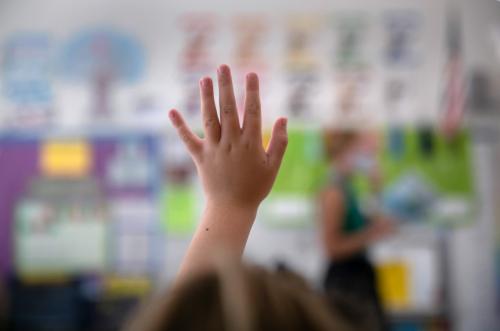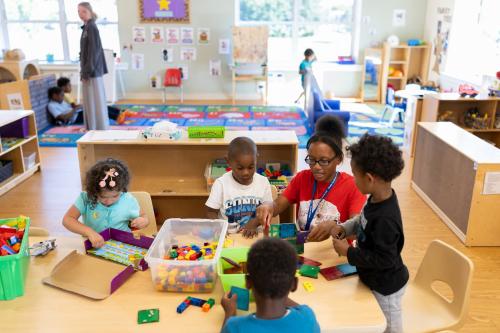How well does pre-Kindergarten prepare children for elementary school and beyond? Many past studies—some of them high quality, randomized evaluations—have found positive effects on cognitive and behavioral outcomes, especially for low-income children, although those effects have frequently been found to fade.
But as Jeanne Brooks-Gunn and Ron Haskins discuss in their policy brief for the most recent Future of Children volume, Starting Early: Education from Prekindergarten to Third Grade, new research from Tennessee has challenged past findings.
What the Tennessee study found
Dale Farran and Mark Lipsey, professors at Vanderbilt’s the Peabody Research Institute, have been following a cohort of 1076 children since 2009, of whom 773 entered Tennessee’s new pre-K program through a lottery. The remaining 303 were in the control group, and not given a spot, though about a quarter attended formal pre-K outside of the state program. The subsample analysis was based on matched comparisons of children who did vs. did not participate in the program rather than random assignment.
In 2013, the authors released their short-term findings, which were positive. Children in the “consenting subsample” who participated in the pre-K program did better on achievement tests at the end of the pre-K year, and they received higher ratings from their kindergarten teachers. Teachers said they were better prepared for school than the control group, had better work skills, and were more positive about school. These findings mirrored those of past studies.
But the authors’ 2015 follow-up report was less optimistic. By the end of kindergarten, the achievement test boost for treatment group children in the consenting subsample had disappeared. By the end of first grade, teachers rated the same children’s work skills and preparation as weaker than the control group; the effects reversed. By the end of second and third grade, control group children did better on academic tests than treatment group children.
What happened?
Other evaluations, like the rigorous Head Start Impact Study, found that preschool academic gains don’t persist even through the end of kindergarten. But the Tennessee results show a negative impact, not just fade-out. Why?
There are a number of possible explanations. Farran and Lipsey have wondered whether the pre-K program’s curriculum is too academically oriented, leading children to disengage with school later on. It’s also possible that, although the pre-K program is high quality, the elementary school teachers haven’t altered their teaching to account for more-prepared students, so the treatment group children became bored and unresponsive. During an event on the Future of Children volume on Wednesday, there was talk of investigating these possible explanations by visiting classrooms and video-taping instruction.
What does this mean for the future of early childhood education?
As William Gormley, a professor of public policy at Georgetown, pointed out on Wednesday: there’s no consensus about what pre-K actually is. In each state, the pedagogy and curriculum looks different. Tennessee took a more rigid, academic approach; Minnesota, meanwhile, has taken a more open-ended approach to universal pre-K.
This variation offers an opportunity for states and cities to learn from one another—especially if the experiments are coupled with rigorous evaluations. The stakes are high: in recent years, the federal government and the states have spent roughly $34 billion on these programs under the assumption that they are vital to the well-being of the next generation of Americans.
The Brookings Institution is committed to quality, independence, and impact.
We are supported by a diverse array of funders. In line with our values and policies, each Brookings publication represents the sole views of its author(s).





Commentary
As many states look to expand pre-K programs, a study gives reason for pause
October 28, 2016